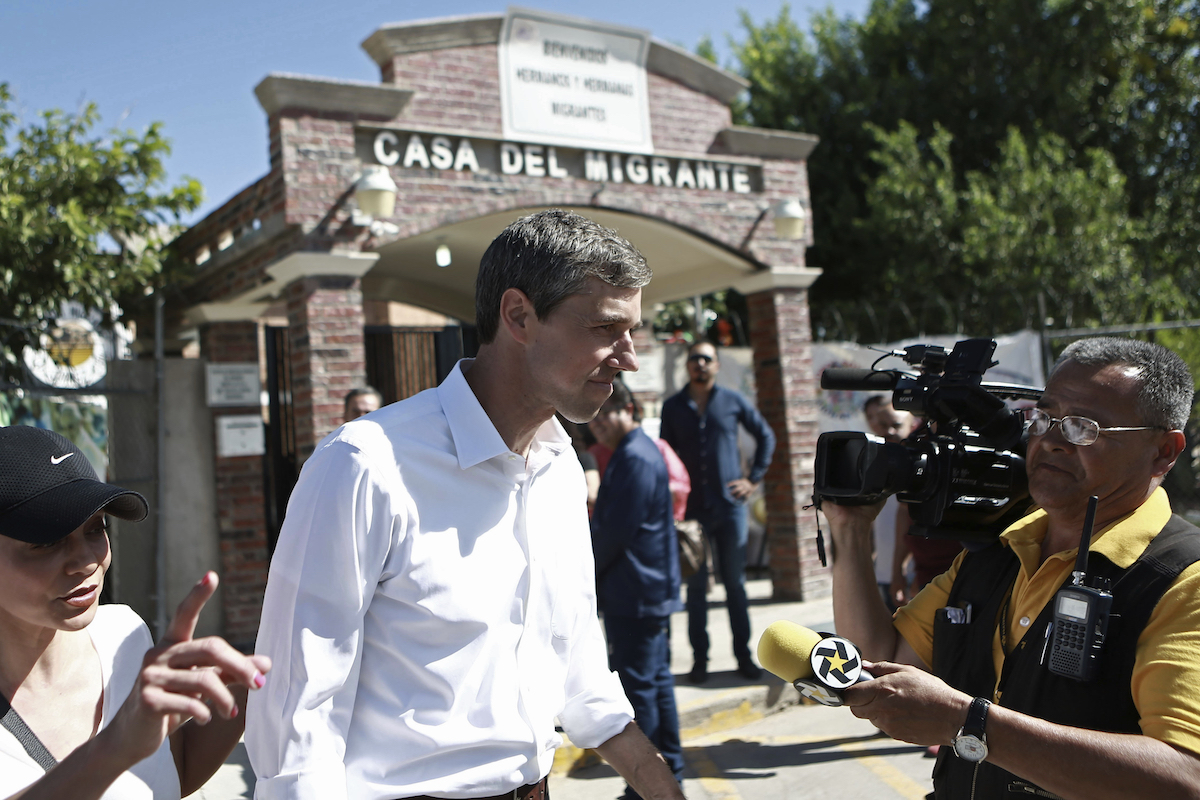

Beto O´Rourke visits the migrant house in Ciudad Juárez, Mexico, Sunday, Jun. 30, 2019. (AP Photo/Christian Torres)
By WILL WEISSERT, Associated Press
A fluent Spanish speaker, O’Rourke met around a table at a shelter with immigrants from El Salvador, Honduras and Guatemala, some of whom wept as they told of being denied entry into the U.S. while their asylum claims are processed. Many said they were terrified they’d be sent back to their home countries, where their lives had been threatened because of abusive spouses, street gang violence or drug smugglers.
“We hope, by sharing these stories, that the conscience of our country is awoken right now, and the need to change the policies that we have in place” becomes apparent, O’Rourke said via a livestream on his Facebook page.
https://www.facebook.com/betoorourke/videos/2361779864101003/
He blames those being forced to wait on “the Trump administration’s unlawful ‘Remain in Mexico’ program,” which has allowed the United States to return thousands of Central Americans to Mexican border cities as they wait to hear about their asylum claims. It is meant to reduce the attractiveness of U.S. asylum requests that in the past had allowed claimants to remain in the U.S. for years as their cases wound their way through the courts.
Praising his hometown as part of the world’s largest “binational” community with Juárez is a centerpiece of O’Rourke’s presidential campaign, and he released a sweeping immigration plan in May calling for providing millions of people in the country illegally with a “pathway” to U.S. citizenship, while deploying thousands of lawyers to the border to help process asylum cases and earmarking $5 billion to improve living conditions in Central America.
O’Rourke has long argued that his border roots make immigration an issue of strength for him, and heading to Mexico may allow him to show off that expertise amid once-promising polling numbers that have flagged in recent months. During the first presidential primary debate in Miami, last week, however, O’Rourke clashed with fellow Texan and presidential candidate Julián Castro, who chided the ex-congressman for not being willing to fully decriminalize crossing the U.S.-Mexico border illegally.
O’Rourke has argued that doing so could result in drug- and people-smugglers being protected.
Castro, a former Obama administration housing chief and San Antonio mayor, told a Texas rally on Friday night that he had suddenly gone from long being outshined by O’Rourke on the campaign trail to becoming “THE Texan in this race.”
Asked Sunday on CNN if he was implying that O’Rourke’s presidential campaign was effectively finished, Castro responded: “No. I have a lot of respect for Congressman O’Rourke,” adding that “he and I get along well” and that the disagreement was purely over policy.
Later Sunday, O’Rourke staged a rally outside the U.S. Border Patrol facility in Clint, Texas, near El Paso, where immigrant children have reported being denied access to such basic amenities as showers, soap and toothbrushes. Castro visited that facility Saturday.
O’Rourke also previously traveled to a center holding immigrant children in Houston, and was one of many Democratic presidential candidates to visit one in Homestead, Florida, near the Miami debate site.
A frequent visitor to Juárez before he began running for president in March, O’Rourke was there in December to meet with immigrants staying in shelters as they waited to begin being processed for U.S. asylum.


